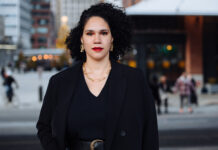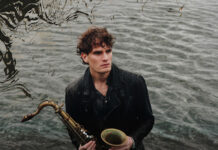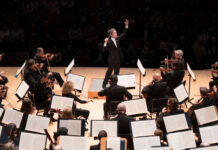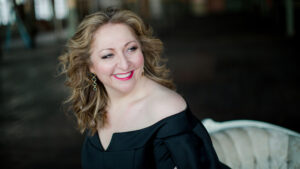
At Cultural Attaché we believe firmly in direct, one-on-one conversations before we post any interview. However, when the person you are interviewing is singing the demanding role of Brünnhilde in Die Walküre, we’ll make an exception. After all, soprano Christine Goerke isn’t just taking on a role she’s been performing since 2015, she’s doing so in a wildly unique production of the opera’s third act on Sunday at the Hollywood Bowl. Gustavo Dudamel will be leading the Los Angeles Philharmonic in the performance.
Yuval Sharon, the innovative director behind Invisible Cities, Sweet Land and productions of The Magic Flute and La bohème that upended long-held traditions, is directing this production. As you’ll see, it’s also not going to be a traditional approach to this second opera in Richard Wagner’s Ring Cycle and it’s going to require a lot of rehearsal time.
So we agreed to ask Goerke about this production via e-mail so she could rest her voice. Goerke, who has also sung roles in Wagner’s Parsifal and Lohengrin, has appeared throughout the world in Elektra, Turandot, Ariadna auf Naxos, Falstaff and many more. We knew she was a tremendously talented singer. What we didn’t know was how great a sense of humor she has. As you’ll see in this interview.
What follows are excerpts from our conversation that have been edited for length and clarity. All emphasis built into her answers are hers.
Very shortly after we posted our BEST BETS for the week on social media, you re-posted and said you were “Very excited about this!” What has you so excited about this particular concert?
There are so many reasons to be excited about this event. First of all, it’s Die Walküre and any opportunity I get to sing Brünnhilde is reason enough to be excited! It’s also my first opportunity to work with Maestro Dudamel, not to mention that it’s been a minute since I’ve been on stage at the Hollywood Bowl.
I will say, however, that this isn’t just a concert. This is a fully staged “experience.” It is a way to approach the storytelling that I have never experienced in opera, and I would imagine it’s something that most of the audience will never have experienced either. It’s *exciting*! (Did I mention – “exciting”?!? LOL!)
Yuval Sharon has proven himself to be one of our most imaginative directors. What does he have in store for this production and what do you think will make it unique?”
Yuval is absolutely one of our most imaginative and innovative directors. I think that often when people hear that a work that they know and love is being “re-imagined” there is trepidation. I get it. But in working with someone like Yuval, who doesn’t just have an incredibly strong vision for a different presentation of something that you think you know, but also has immense knowledge and love of the work, that has given all of us an incredible glimpse into the new direction in which he is taking our art form.
His production of Act 3 of Die Walküre takes place in a world that Wotan has created. It is a digital world and we can truly see this when things start to fall apart (I’ll let you all join us at the performance and see exactly what that means!) The singers are all working in costume with a green screen.
We are essentially offering two performances which are going on at the same time. Different cameras will be picking up different parts of the story/staging and adding the stage elements to the digital offering (which the audience can view at the same time on the screens placed around the Hollywood Bowl). We will all be on the stage interacting with each other in ways that perhaps you won’t see on the screens at all times. It is definitely some hardcore multi-tasking for us, but it is worth it and we’re all loving it.
This is not the first time you have worked with Sharon. What resonates most about your collaborations with him?
Collaborating with Yuval is really quite remarkable. He’s warm and genuine to work with as a director and he comes armed with an immense amount of knowledge. He knows exactly what he wants, but he is willing to listen to the people in front of him and take their thoughts and needs into account. Often his innovative ideas can be a bit jarring (and I mean this as a compliment), but if you allow yourself to step in and go along for the ride it’s a hell of a lot of fun!
How do you think Sharon takes Wagner’s theory of Gesamtkunstwerk (a total work of art) into the 21st century and how does it apply to this concert?
It’s interesting…Wagner was so specific as to what he envisioned for his Ring Cycle. He was a great dramaturg. He wrote of fantastical beasts and journeys and epic sagas. I truly believe that we are simply moving through that journey and every day, with every new way to tell stories – here through a digital medium – we continue that storytelling journey. It is ever-evolving with whatever new technology and innovation that we are able to offer to it and we are speaking to people in a way that is perhaps more relatable to what we now know and are able to create. I believe this invites more people in to what has, at times, seemed elitist.
You began singing Brünnhilde in productions in 2015. Though the pandemic interrupted your schedule, how has your relationship to this character and her music evolved since those first performances with the Canadian Opera company?”
Ohhhh Brünnhilde…This character has been and always will be so close to my heart. She is an incredibly fully-formed character like no other that I’ve been able to portray. When I first took her on at the Canadian Opera Company in 2015, I was a little terrified. I would have been insane not to have been! I think it’s fair to say that the first time we do any role we don’t get to the root of it. In fact, I feel like the ones that are really and truly worthwhile are the ones that are constantly teaching us something new every time we come back to them.
Brünnhilde begins her journey in Die Walküre as a naive and somewhat “know-it-all” teen; righteous and indignant. She then finds fear and disappointment as the person she loves most, her father, falls from his pedestal. She goes on in Siegfried to find love again, but then finds betrayal in Götterdammerung, as well as her own internal strength, integrity and power.
It all sounds incredibly grand, but when you take it down to bare bones we have all been that know-it-all teen who has no idea what the world has in store for them. We have all seen a parent that we have on a pedestal of perfection become fallible in our eyes. We have all fallen in love, been betrayed and hopefully, found our inner strength and worth, allowing us to accomplish great things.
Those things in all of our lives are ever-evolving. That is what I hope I can bring to this character and it changes every single time I have the honor of portraying her.
At what point can you tell if the production of the Ring Cycle in which you’ve agreed to appear will be a good one or not?
As far as I am concerned, every production of a Ring can be great … though we all admittedly might prefer one over another.
As someone who has seen only one Ring Cycle and was frankly scarred by it, what would you say is the reason to give the entire work another try? It should be noted that hearing you sing the Immolation Scene with the LA Philharmonic in concert went a long way towards doing so.
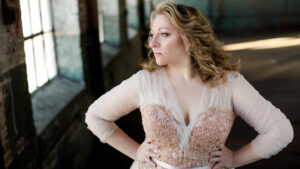
First, I’m heartbroken to hear that you were scarred by a Ring Cycle! I think it’s the coolest story in all of opera. Look, at times it is difficult to divorce yourself from say… a costume… or a set… or the lighting… or even the premise for the storytelling in which the director is asking you to immerse yourself.
In the end the text, the music, the interpersonal relationships on stage, they don’t change. There is an incredible intimacy in a grand saga here. It offers an insanely wide span of emotional depth and, let’s face it, visceral volume*. (See This Is Spinal Tap “the numbers go up to 11”)
In its simplest form? It’s a story of a wildly dysfunctional family. I have a funny feeling that we can all relate to that on some level!
In an interview with Alex Ross for Pitchfork, writer Cat Zhang says, “The anarchist Emma Goldman allegedly remarked that Wagner’s music helped women release ‘the pent-up, stifled and hidden emotions of their souls.'” Assuming she made that remark, was Emma Goldman right? What does his music help you do?”
Oh Emma. These days very few women have those soulful emotions pent-up, stifled OR hidden. This just gives us a fabulous soundtrack with which to let them fly.
I hope that the next time I have a conversation with Christine Goerke, it will be in person. And I can’t wait to see Sunday’s concert!
All photos by Arielle Doneson/Courtesy Opus 3 Artists


